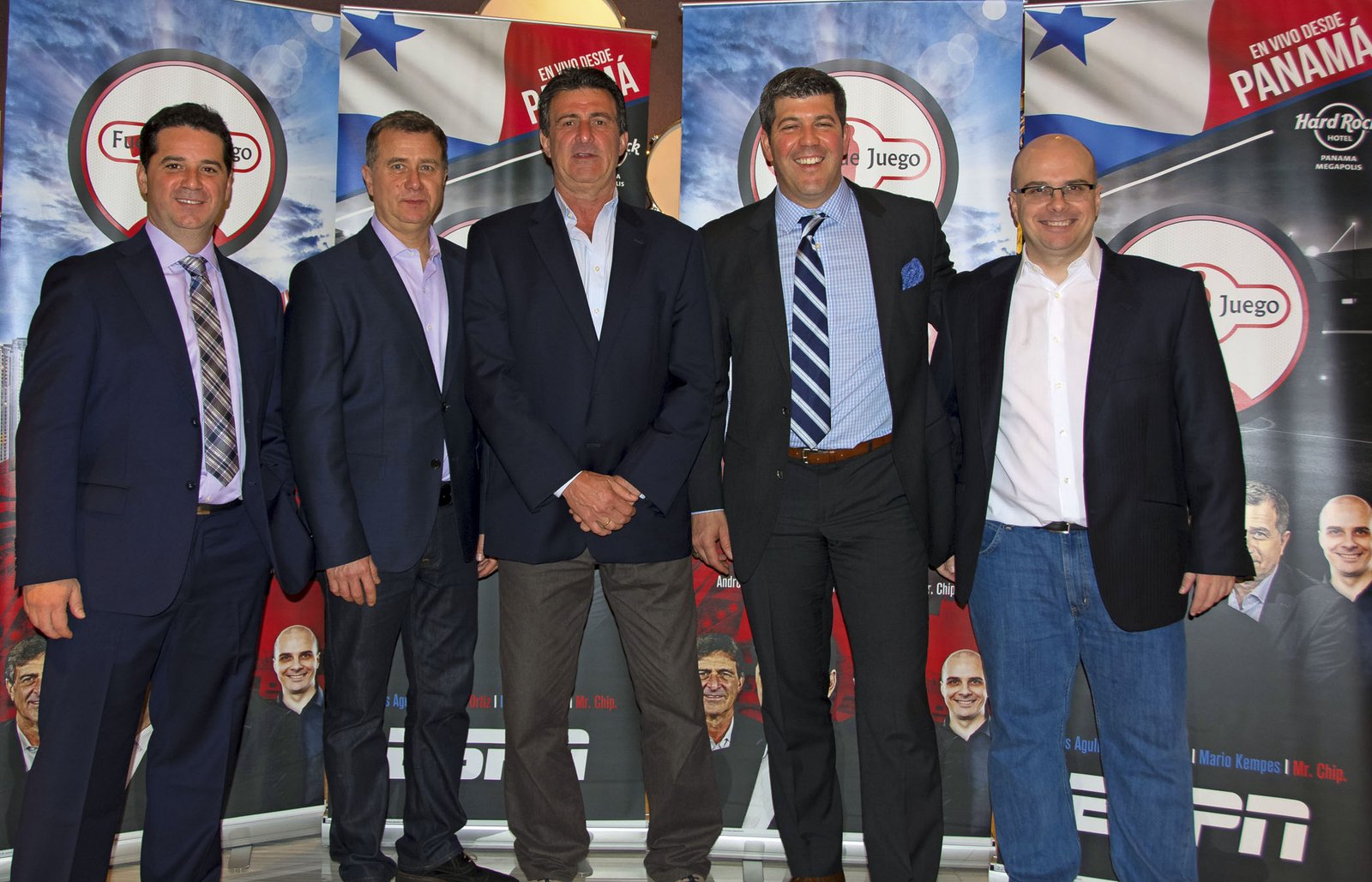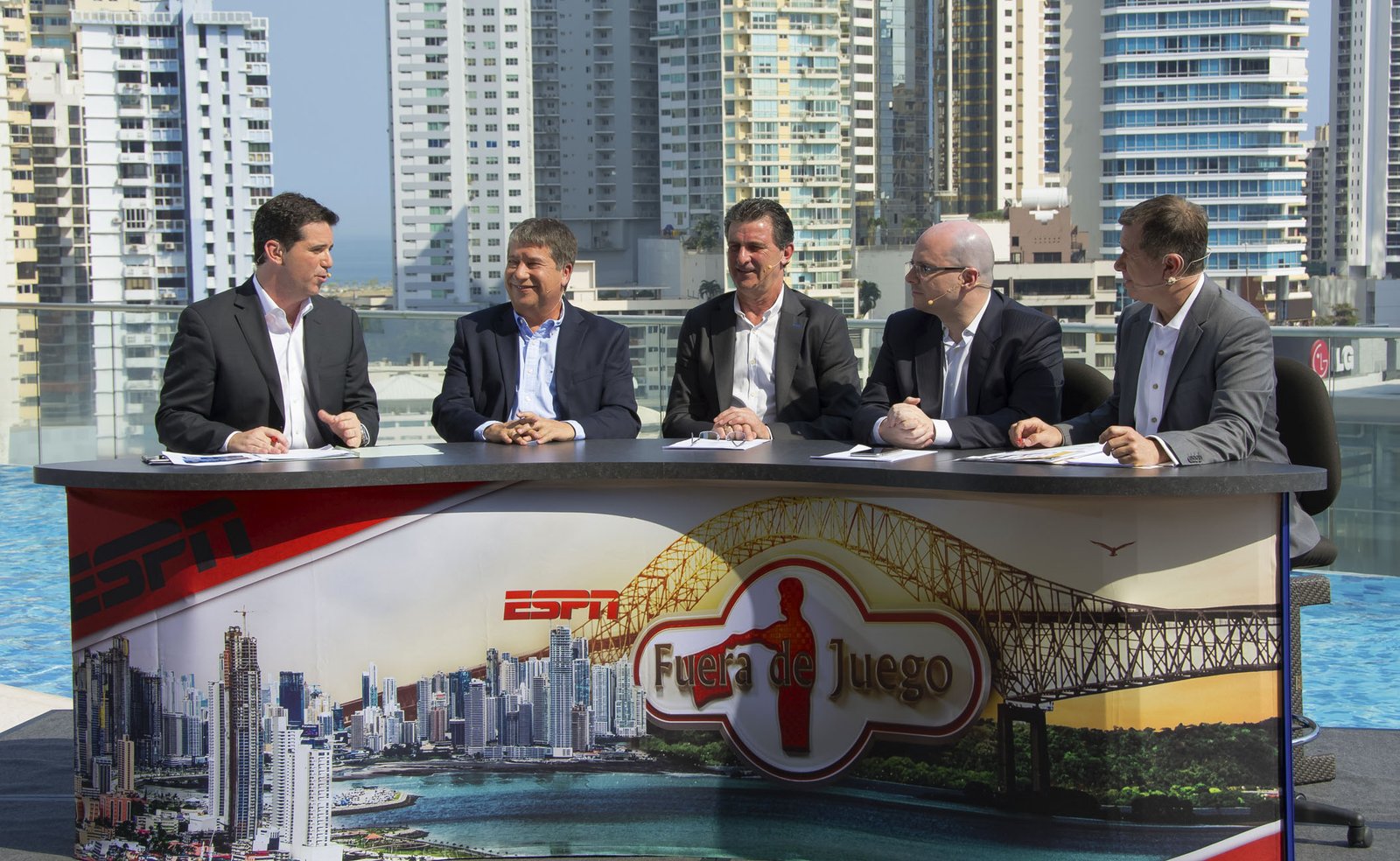
on the Road
By Álvaro Sarmiento Meneses
Photos: Carlos Gómez
As the world turns, so does the soccer ball, twenty-four hours a day. Soccer is one of today’s major sporting and entertainment attractions, inspiring hundreds of television, radio, print, and online transmissions. Following the rhythm of the ball’s movement, U.S. sports network ESPN, which offers a Spanish language channel for U.S. and Latin American markets, decided to broadcast its program, “Fuera de Juego,” from Panama this past March 30. The idea was to take advantage of the so-called Fecha FIFA that allows clubs to cede their players for a week to play in elimination or friendly games with their national teams. In Panama City the team was received warmly and moved like “fish in water.” The ESPN team arrived with five of their members, including the legendary Mario Alberto Kempes —Argentine champion and scorer of the ’78 World Cup, who works as a commentator – and the renowned Salvadoran announcer and sportscaster Fernando Palomo. We spoke with them about their lives, their vision of the sport, and the program.
Mario, your name is spelled with bold capital letters in the world of soccer. Are you a happy person?
I am very happy; I did the things I dreamed about as a boy. I was lucky that I excelled in my city, Bell Ville. They sent me to Cordoba and I continued to improve. But, somehow, I must have had that extra pinch of luck for someone to say, “Well, take the ball… and if you can make a goal in the next fifteen minutes, I’ll give it to you.” I made two. I could have not made any and maybe they would have sent me back; luck is important. I am a person who has done all that he has had to do in soccer and done it well; that allows me to be on ESPN and continue having fun with the sport.
Fernando, you excelled in the javelin throw and you studied marketing. Do you recognize, deep down, that soccer is the king of sports?
My path is not a conventional one. My thing was to take the sport to the max of my abilities, and track and field was a sport that captivated me, but that didn’t mean that soccer was far from my sights. I trained in track and field from Monday to Saturday, but on Sunday I would watch soccer with my brothers. When I was a boy I saw Mario play and followed generations of soccer players. I didn’t study something related to television reporting or sports journalism because of a life ambition closer to what my father wanted than what I would have preferred. He didn’t force me to do anything that I didn’t want to do, but I liked this and I dedicated myself to it.
Mario, how was it when you saw Fernando for the first time?
(Mario) The first time I held out my hand to pull him up and later I sent him away [laughs].
(Fernando) I’m going to jump in a bit. When we played our first Champions League final, Mario noticed that I was worried about doing a good job, for myself especially…
(Mario) From that day to the present.
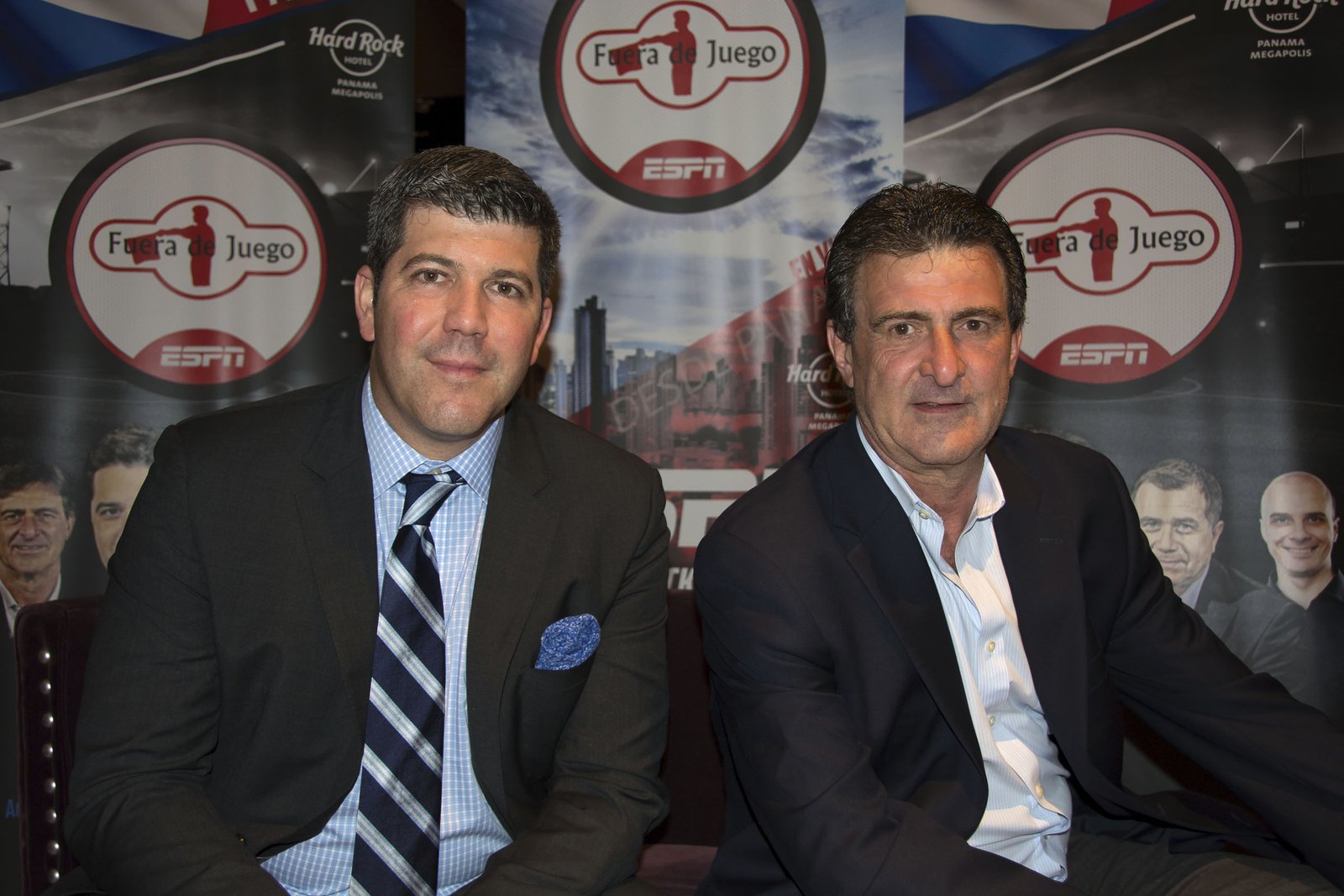
(Fernando) I’m going to thank Mario for a gesture, which perhaps he has never thought of. It has had such an impact on me. We were outside of the stadium in Athens, at the 2007 Champions League final. He said to me fondly, “Look you, stubborn ox, why are you so worried? Give me your hand… come, I’ll lead you.” That relaxed me, it made me feel that although this was not just another game, it was still a game and I didn’t have to be so nervous. The genuine gesture of a veteran reassured me.
(Mario) From the day I met him, I have admired his preparation before games. He is a person who doesn’t want to make any mistakes. If he’s going to say something about Messi, he won’t miss a letter or a number. I’ll tell you, I have heard so many commentators and I learned a lot in Argentina. Fernando is one of the best.
Mario, now that you are a commentator, do you better understand the work of reporters?
There are reporters who do good reporting and reporters who look for the five-legged cat. There always have been, there are now, and there always will be because there is always someone who breaks the rules. If they were all the same, there wouldn’t be so much controversy. But I think journalism is like playing soccer: everyone is going to defend his own turf, but if you do it right, you will always have more opportunities to get what you want.
Fernando, can the current magnitude of soccer as an entertainment business be understood without considering the media and journalists who are always broadcasting its activities?
There are two elements. The first is the marriage between television and soccer, which has taken soccer to this level. Soccer revenue increases as television rights grow, contributing to our show and the salaries of the great players and others. The other element is the continuing work of reporting. I always remember what Ryszard Kapuscinski said: “The work of reporters is not to step on the cockroach, but to turn on the light so that people can see how the cockroaches run for cover.” This is how I try to stay as objective as possible. My work is not to step on people; my job is to turn on the light. There are things that bother a lot of the leading players, and the work of a reporter is not to make them feel comfortable; it’s to say the things that they know, telling the truth, and being respectful.
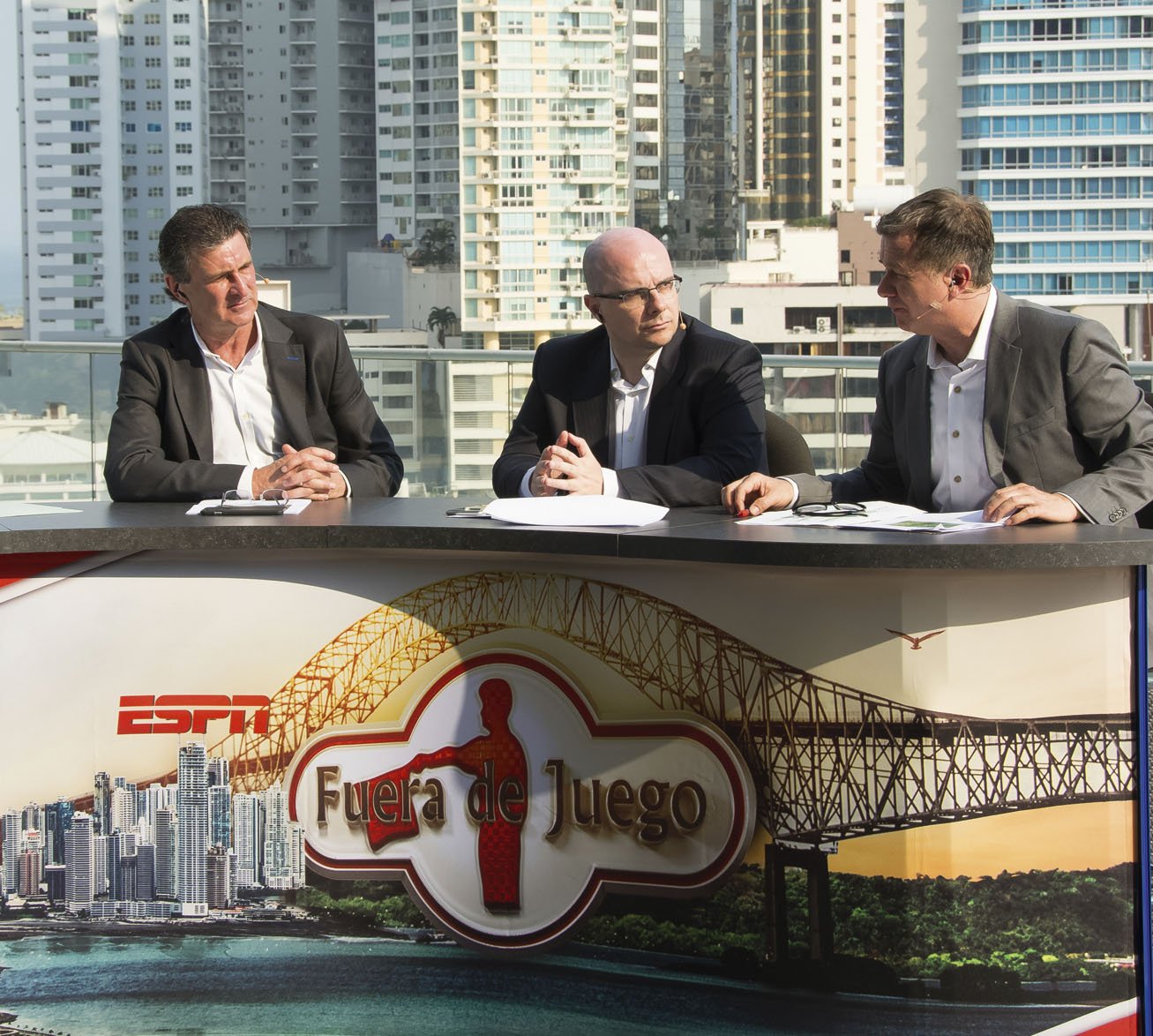
Mario, now that you no longer play, has Fuera de Juego given you a more global perspective on soccer?
It’s different. Yesterday I played and I enjoyed it, today I look at it from the outside and I also enjoy it. Communications are more fluid now: today there is a goal in Italy and you can watch it in China, and vice versa. It can be analyzed better.
Fernando, what has made Fuera de Juego so successful?
If Fuera de Juego is more popular than other programs, I am very grateful. When we planned the program, we wanted it to stay as close to soccer as possible. We don’t have an exclusive location as a regional reference; our reference point is the continent: it’s a Latin American program, about Latin American soccer and Latin Americans playing soccer in Europe. It’s true that the world of soccer includes business, politics, trade, and show business…. We try, as much as possible, to stay with the game itself. When we talk about a hotel in Switzerland where there have been police raids and soccer officials taken out in handcuffs, it is because it’s something we have to expose. I feel guilty for not giving more time to the search for mobsters living off the game, but really what we like best is the game.
And the game, as a game, will survive all these adverse events?
The game has survived the game itself. When people thought that all the matches would end 0-0, they found the Brazil of 70, then Johan Cruyff and Holland. The game always finds a way to overcome its own apocalypse.
In this region, you are two of the leading voices on one of the best selling video games in the world: FIFA (in its different yearly editions). Young people follow it and play it passionately. What dynamics lead to this participation?
(Mario) One’s imagination is playing on a soccer field.
(Fernando) It’s a fun process; we see nothing….
You don’t see the players moving on the screen?
(Fernando) No. It’s a closed cabin. We see the game in our imagination. There is a guide to a file that is related to a play. The game takes into account how many plays can happen in soccer. Before sitting down to record, we talk about five or six alternatives and then we narrate these plays. We only hear the noise from the crowd. I think that Mario imagines a stadium in which he has said 80,000 phrases. I imagine a completely different stadium where we have reported 80,000 phrases together.
(Mario) Sometimes what he says has nothing to do with what I say. He changes the list of names or the team, the best defense, or the worst attack.
(Fernando) Yes. Because I connect what I say with one situation, and Mario connects what he says to another one. It’s a process in which we talk for an hour without knowing what we have talked about and it ends up being a video game. Disney does the rest. We also get criticized a lot because we try to make it fun. We make fun a bit; something we wouldn’t do in a live broadcast. One time a player wrote me and said, “Why do you insult me in the game?” And another wrote me on WhatsApp to say, “Give my best to Marito, good broadcast.” I was at home drinking coffee and I replied, “I’m not broadcasting.” Three minutes later he responded, “Ugh! Those were my kids playing FIFA in their room.”
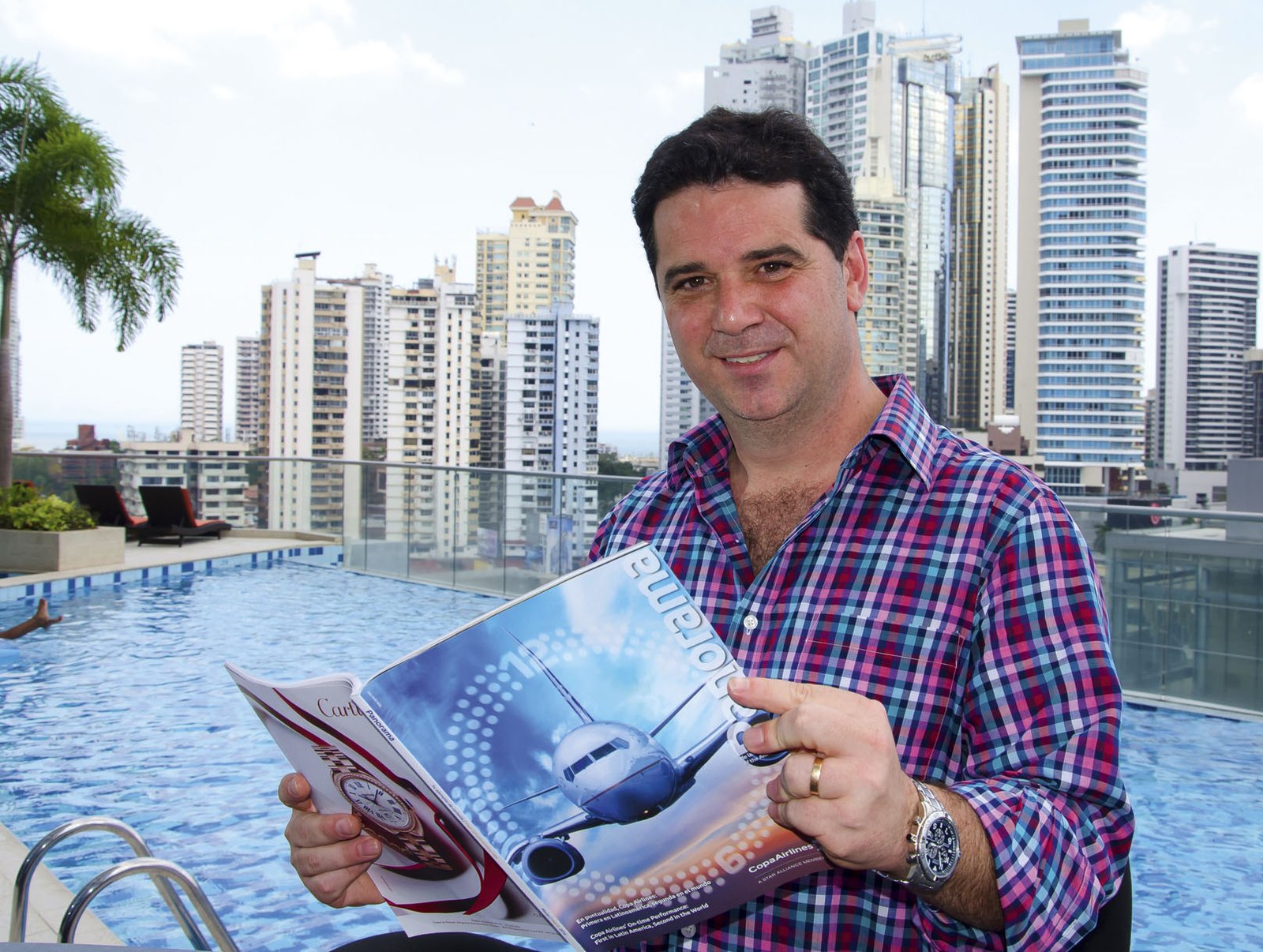
On the topic of technology, now applied to the game itself, FIFA recently approved the use of video for next season, but experimentally and offline, without communication between the referee and the video assistant. Starting with the 2017-2018 season, the video will be online and include communication and decision-making. Four plays are included: scored goals, red cards, penalties, and signaling errors on who committed the foul. Is this a great advancement or do you have a more conservative position on this?
(Fernando) Technology’s not going to solve anything. Except to tell the referee that he was wrong.
In sports, technology has been a great help in the United States. Isn’t it time to use it more, to rely more on a tool that can prevent unmerited penalties and yellow cards, instead of throwing away an investment and the team’s work because of an unfair decision?
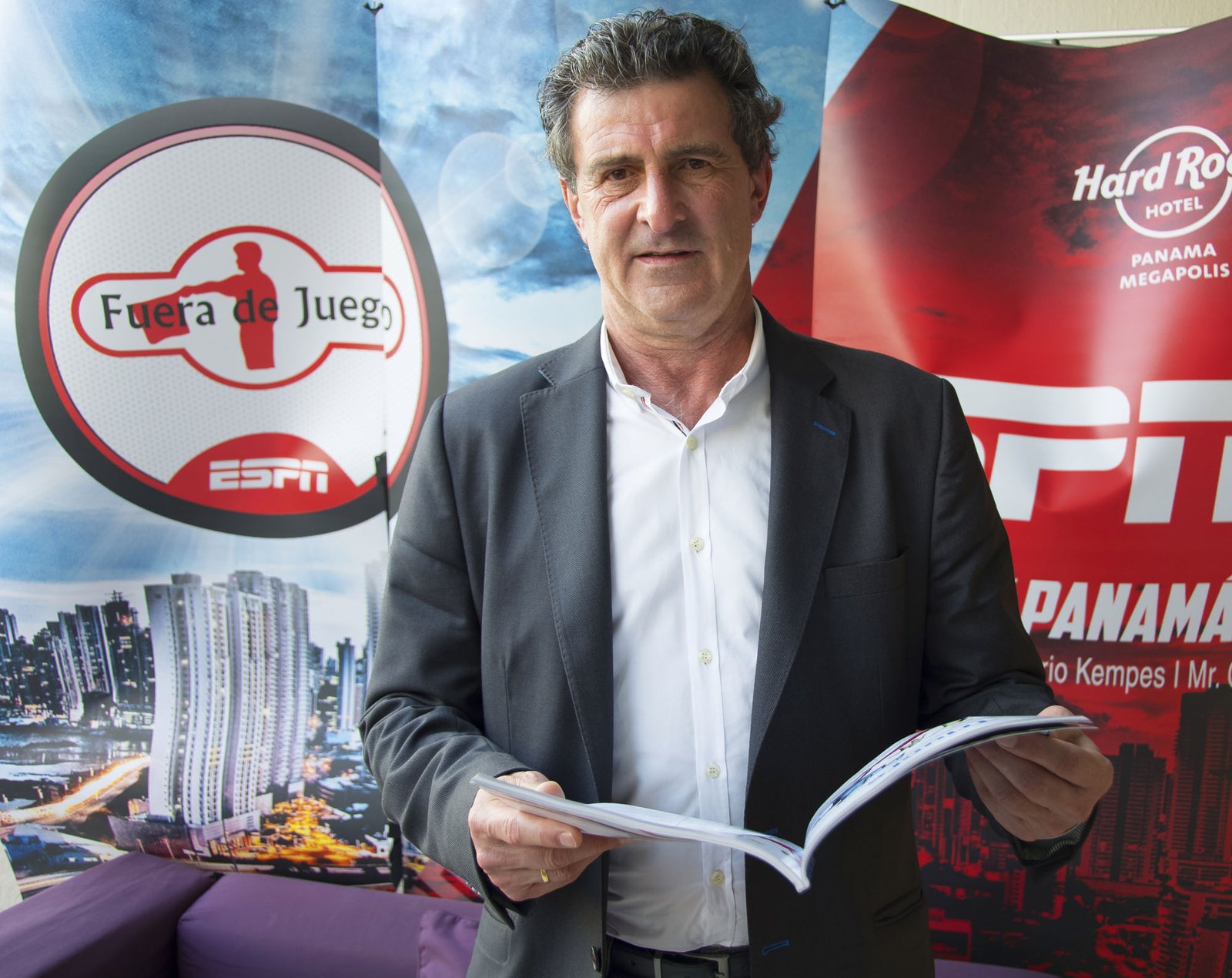 (Mario) For me, I think it should be used only for the goal, which is the most controversial. Because in soccer, if you take away all the beautiful things it has it’s going to become a video game, devoid of controversy. If we mechanize everything and make it robotic, we will lose soccer.
(Mario) For me, I think it should be used only for the goal, which is the most controversial. Because in soccer, if you take away all the beautiful things it has it’s going to become a video game, devoid of controversy. If we mechanize everything and make it robotic, we will lose soccer.
(Fernando) I don’t think that technology should be used to resolve things that would directly affect the result of a match. If there’s a penalty or some player threw himself down, only then.
Mario, you regularly get asked who the best soccer players are. In homage to the late Johan Cruyff, I want to change the question. Who are the best coaches?
(Mario) Just like that, point blank?
Just like that, point blank, like when you drop the ball by surprise.
Hmm…. Mourinho, Pep Guardiola, Luis Enrique (right now).
And Johan Cruyff?
He surprised me more as a player, but there you have it, put him down: Johan Cruyff.
